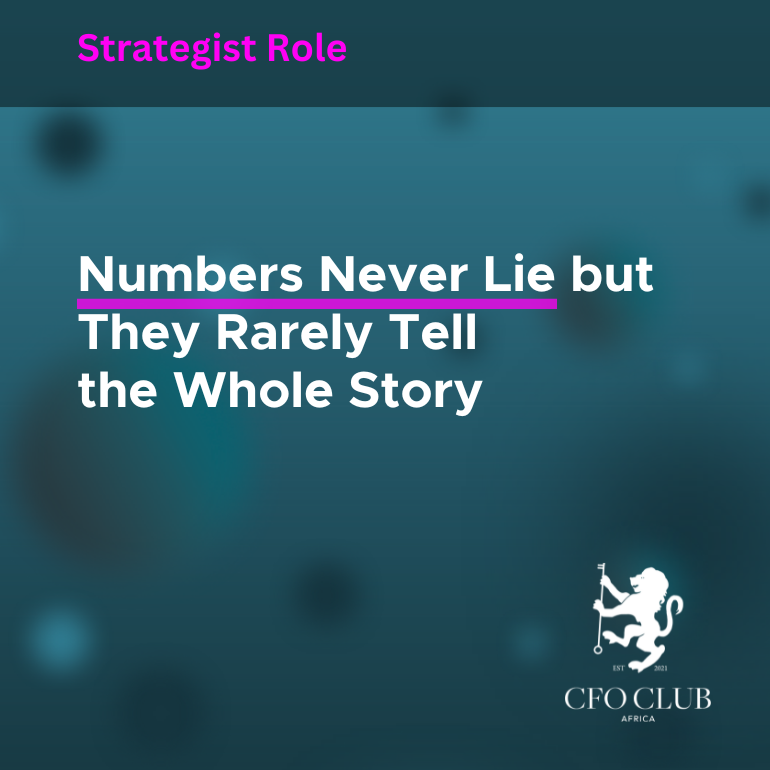Numbers Never Lie but They Rarely Tell the Whole Story
For too long, financial analysis has been seen as a back-office function—processing numbers, producing reports, and ensuring compliance. While these tasks are necessary, they barely scratch the surface of what finance professionals can bring to the table. The real value lies not in reporting the past but in questioning, interpreting, and challenging financial data to drive better decisions for the future.
Yet, in many organisations, the status quo remains unchallenged. Financial reports are produced the same way they have always been. Assumptions are rarely questioned. Decisions are made based on “how we’ve always done things.” And opportunities for deeper insights are missed.
So how do we move from routine financial analysis to something more insightful? How do we create a culture where finance professionals actively challenge assumptions, look beyond the numbers, and uncover the bigger picture?
Breaking Free from the ‘Tick-Box’ Mentality
In many businesses, financial reporting is treated as a compliance exercise—monthly reports are submitted, management reviews the figures, and decisions are made based on standard templates. The problem? This approach assumes the numbers tell the full story, but they rarely do.
Consider this: A company’s revenue has increased by 10% compared to the previous year. On paper, that looks like good news. But if no one asks why, the bigger picture is missing. Did strong demand drive this growth, or was it due to heavy discounting that could hurt profitability? Did the increase come from a sustainable customer base, or did it result from one-off deals? The ability to challenge the surface-level narrative is what separates a routine financial analyst from a truly insightful one.
This shift requires moving away from simply reporting figures to interrogating them. A culture of insightful financial analysis means that instead of passively accepting numbers, finance teams become active participants in shaping the business strategy.
Encouraging Curiosity in Financial Analysis
At the heart of insightful financial analysis is curiosity—the willingness to ask, “Why is this happening?” and “What else could this mean?” Unfortunately, many finance professionals are not encouraged to think this way. Either they are bogged down by routine tasks, or they work in an environment where questioning assumptions is discouraged.
Leaders can foster a more inquisitive approach by encouraging financial teams to explore different scenarios. Instead of simply reporting on what happened last quarter, they should be asking:
- What would happen if a major supplier suddenly increased prices?
- How would a recession impact customer spending habits?
- Which factors are most likely to influence cash flow over the next 12 months?
When finance professionals move beyond historical reporting and start thinking in terms of future possibilities, they provide real strategic value to the business.
Beyond the Numbers: The Human Side of Finance
One of the biggest mistakes in financial analysis is assuming that numbers alone tell the whole story. They don’t. Financial data reflects human behaviour—customers choosing to buy (or not), employees making decisions, and market forces influencing spending patterns.
This is why finance teams must engage with other departments rather than working in isolation. A sales dip could be due to poor customer service, a marketing campaign targeting the wrong audience, or a sudden change in consumer trends. By speaking to sales, operations, and marketing teams, finance professionals can piece together a much richer and more accurate picture.
A culture of insightful financial analysis thrives in organisations where finance teams are not just number crunchers but active business partners. They should be encouraged to ask questions, challenge assumptions, and bring fresh perspectives to discussions.
Overcoming the Fear of Challenging the Status Quo
One of the biggest barriers to insightful analysis is fear—fear of being wrong, fear of challenging senior management, or fear of disrupting established ways of working. In some organisations, questioning financial data is seen as criticism rather than an opportunity for improvement.
To change this, businesses must create an environment where questioning is not only accepted but encouraged. Senior leaders should welcome analysis that challenges assumptions, and finance professionals should feel safe to raise concerns without fear of backlash.
Consider companies that failed because they stuck to outdated financial assumptions. Blockbuster underestimated the shift to digital streaming, despite financial analysts warning of declining rental trends. Kodak failed to adapt to the digital camera revolution, even though their financial data showed the decline of film-based photography. In both cases, questioning the status quo could have saved them.
The Role of Technology in Insightful Analysis
Modern finance teams have access to more data than ever before, but data alone is not enough. The key is knowing how to interpret it. Advanced analytics, artificial intelligence, and predictive modelling can help uncover trends and risks that might otherwise go unnoticed. However, technology should be seen as a tool, not a replacement for human judgment.
Financial professionals must develop strong analytical skills to extract meaningful insights from data. This means going beyond spreadsheets and embracing tools that allow for deeper scenario planning, forecasting, and business intelligence reporting.
Conclusion: A Mindset Shift for the Future of Finance
Building a culture of insightful financial analysis is not about adding more reports or increasing the complexity of financial models. It’s about shifting the mindset—from passive reporting to active questioning, from rigid assumptions to flexible thinking, and isolated finance teams to integrated business partners.
Finance professionals who develop the ability to challenge the status quo, ask the right questions, and see beyond the numbers will be the ones driving the future of business. And organisations that embrace this culture will be far better positioned to navigate uncertainty, seize opportunities, and achieve long-term success.

